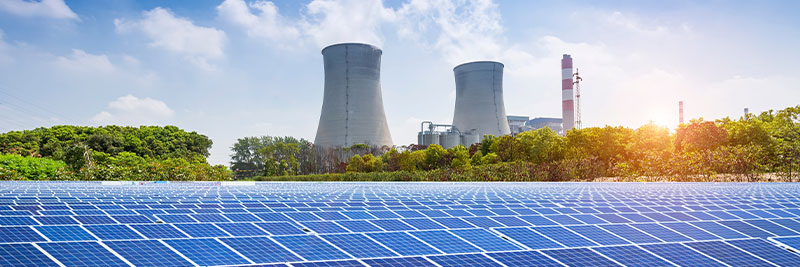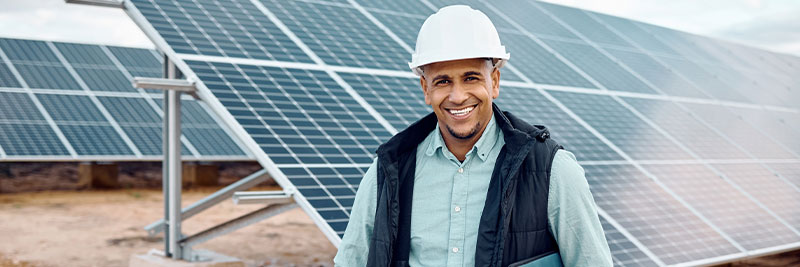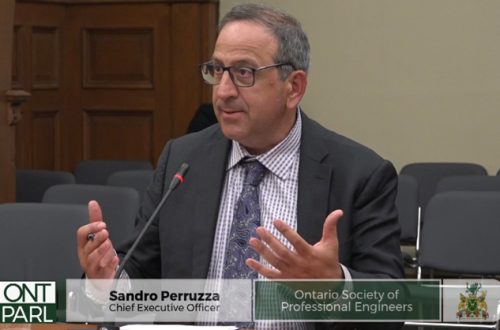On April 16th, 2024, Finance Minister Chrystia Freeland tabled the 2024 Federal Budget in the House of Commons. This Budget has a clear focus on expanding opportunities for all generations of Canadians, with investments in housing affordability, tax reform and job creation. Budget 2024 is built of eight pillars: More Affordable Homes, Lifting Up Every Generation, Lowering Everyday Costs, Economic Growth for Every Generation, Safer, Healthier Communities, A Fair Future for Indigenous Peoples, Protecting Canadians and Defending Democracy and Tax Fairness for Every Generation.
OSPE has identified the following areas that are of the greatest relevance to our membership. Keep reading below to find out more about what Budget 2024 means for engineers.
Affordable Housing Development
Budget 2024 includes significant investments in housing and public land use, aiming to increase the development of affordable housing across Canada. Key investments include $500 million for the Public Lands Acquisition Fund to purchase land for housing; $112.6 million for the Federal Lands Initiative to unlock 1,500 new homes; and $15 billion in new loan funding for the Apartment Construction Loan Program to build over 30,000 homes. Additionally, $400 million over four years is allocated to the Housing Accelerator Fund to fast-track 12,000 new homes, and $6 billion over 10 years for the Canada Housing Infrastructure Fund to support housing-enabling infrastructure.
Impact
Budget 2024’s investments in housing and infrastructure create new opportunities for innovative construction projects. Increased funding for affordable housing initiatives, such as the Apartment Construction Loan Program and the Housing Accelerator Fund, will accelerate project timelines and create a demand for sustainable and energy-efficient designs.
Engineers should benefit from a focus on modernizing housing and the introduction of new construction technologies like modular housing and 3D printing. OSPE advocates for the need to invest in innovative and sustainable housing-enabling infrastructure, such as innovative wastewater management techniques, and hopes to see investments in projects like these through the Canada Housing Infrastructure Fund.
Research and Innovation
Budget 2024 includes several measures to bolster research and development in Canada, focusing on artificial intelligence (AI) and other key sectors. It allocates $2 billion for an AI Compute Access Fund and the Canadian AI Sovereign Compute Strategy to provide researchers and businesses access to needed computational power. Additional funding supports AI start-ups, safety, and deployment, with the creation of an AI Safety Institute of Canada and the enforcement of the proposed Artificial Intelligence and Data Act.
Furthermore, the budget proposes enhancing the Scientific Research and Experimental Development (SR&ED) program, establishing a preferential tax rate for income earned from Intellectual Property (Patent Box Regime), and working with Talent for Innovation Canada to develop an exceptional R&D workforce across bio-manufacturing, clean technology, electric vehicle manufacturing, and microelectronics.
Budget 2024 also provides funding to innovative housing technologies with $50 million allocated, and $20 million is provided for modernizing housing data collection.
Impact
The investments outlined in Budget 2024 will provide Canadian engineers with enhanced access to AI resources and infrastructure, enabling them to advance research and develop innovative solutions across various sectors. Support for AI start-ups and small to medium-sized enterprises will create more opportunities for engineers to work on cutting-edge projects and bring new technologies to market.
The creation of the AI Safety Institute of Canada will guide engineers in ethical AI development, while increased funding for research facilities will provide engineers with more opportunities to innovate in this field.
OSPE has undertaken substantial research into the need to legislate smart technology and educate people on safe usage. The new investments in AI safety pose opportunities for government to collaborate with engineers and privacy professionals to ensure safety considerations are incorporated into the design and development of these technologies.
Additionally, enhancements to the SR&ED program and proposed tax incentives will support engineers in pursuing ambitious research and innovation projects, contributing to the growth of Canada’s technology-driven industries.
Cleantech
Budget 2024 includes several investments in clean technology to support the transition to a low-carbon economy. It introduces a 10% Electric Vehicle (EV) Supply Chain investment tax credit for investments in EV assembly, battery production, and cathode active material production in Canada.
The Canada Growth Fund is also developing an expanded range of contracts for emissions reduction and carbon offtake agreements. Overall, these investments aim to boost the clean tech industry, support the growth of electric vehicles, and facilitate the adoption of renewable energy sources.
Impact
The investments in clean technology outlined in Budget 2024 will provide Canadian engineers with opportunities to work on cutting-edge projects in the EV supply chain, renewable energy, and emissions reduction. The 10% EV Supply Chain investment tax credit and Clean Electricity investment tax credit will encourage engineers to focus on EV assembly, battery production, and renewable energy sources such as wind, solar, and geothermal.
Additionally, the Canada Growth Fund’s focus on emissions reduction offers engineers collaboration and research opportunities across clean tech sectors.
Sustainable Infrastructure
Budget 2024 introduces measures to streamline and accelerate project approvals and timelines, particularly for clean growth and infrastructure projects. The budget allocates $9 million over three years to the Privy Council Office’s Clean Growth Office to address interdepartmental inefficiencies and establish a Federal Permitting Coordinator for smoother permitting processes.
Additionally, Indigenous participation in major projects will be advanced through the Indigenous Loan Guarantee Program and the establishment of a Crown Consultation Coordinator.
Additionally, up to $500 million per year will be disbursed to support biofuel production in Canada, targeting renewable diesel, sustainable aviation fuel, and renewable natural gas. The Clean Fuels Fund will also be extended for another four years, until 2029-30, with a total of $776.3 million available to support clean fuel projects. The Canada Infrastructure Bank will invest at least $500 million in biofuel production under its green infrastructure investment stream.
Budget 2024 also allocates $3.1 billion over 11 years to Atomic Energy of Canada Limited to support Canadian Nuclear Laboratories’ ongoing nuclear science research, environmental protection, and site remediation work.
Impact
The measures to streamline and accelerate project approvals will provide engineers with faster access to projects and reduce bureaucratic delays, potentially leading to more efficient project management and completion. Indigenous participation initiatives offer opportunities for collaboration on projects, fostering inclusive and diverse engineering practices.
Substantial investments in biofuels production and clean fuel projects, present engineers with the chance to work on innovative renewable energy solutions. and open avenues for engineers in the sustainable energy sector.
Lastly, investments in nuclear science research and site remediation work provide engineers with long-term projects in nuclear research, environmental protection, and site management.
Transportation
Budget 2024 proposes significant investments in transportation infrastructure, particularly focusing on rail services. This includes providing $462.4 million to support VIA Rail’s network operations. Additionally, funding will be allocated for VIA Rail to replace its aging fleet on routes outside the Quebec City-Windsor corridor. The budget also allocates $63.1 million to renew the Remote Passenger Rail Program, which supports Indigenous-owned rail operators serving communities in Manitoba, Quebec, and Labrador. Furthermore, $371.8 million will be provided to VIA Rail and Infrastructure Canada to advance the design and development of high frequency rail.
Impact
The investments in transportation outlined in Budget 2024 provide significant opportunities for engineers, including working on the development and modernization of rail infrastructure across Canada. These projects involve replacing aging train fleets, advancing high-frequency rail, and supporting remote passenger rail services, all of which offer engineers opportunities to innovate and implement sustainable solutions.
The Federal Government should also consider the need to modernize Canada’s rail infrastructure in terms of accessibility design. As a recent OSPE report revealed, Canada does not have any laws specifying requirements of the horizontal and vertical gap between platforms and trains and much of our existing infrastructure does not meet internationally recognized best practice standards.
Education
Budget 2024 announced the government’s intention to extend the increase in full-time Canada Student Grants from $3,000 to $4,200 per year, and interest-free Canada Student Loans from $210 to $300 per week, for an additional year. Increased student grants and loans will be available for the 2024-2025 school year, at an estimated total cost of $1.1 billion in 2024-25. In addition, Budget 2024 proposes to provide $207.6 million to the Student Work Placement Program to encourage practical and hands-on work integrated learning placements for post-secondary students.
Budget 2024 also focuses on increasing support for First Nations post-secondary students to close the education gap between Indigenous and non-Indigenous Canadians. The budget proposes an investment of $242.7 million to enhance access to post-secondary education for First Nations students through the Post-Secondary Student Support Program.
Budget 2024 included an allocation of $39.2 million to Innovation, Science and Economic Development Canada to advance the next phase of CanCode. CanCode is a federal program that, since its launch, has helped over 4.5 million students—from kindergarten through grade 12—to develop coding and digital skills, priming kids for success in science, technology, engineering, and mathematics.
Impact
The investments in education announced in Budget 2024 pose significant impacts on engineers and aspiring engineers. The extension of increased full-time Canada Student Grants and interest-free Canada Student Loans promises to help engineering students afford their education, reducing financial burdens and increasing access to post-secondary education. The proposed funding for the Student Work Placement Program encourages hands-on work-integrated learning, providing engineering students with practical experience and skills development to prepare them for the workforce.
Increased support for First Nations post-secondary students can foster opportunities for Indigenous students to pursue an engineering education.
Additionally, the advancement of the CanCode program primes students for future success in engineering and technology fields.
International Engineering Graduates
Budget 2024 proposes to provide $50 million to Employment and Social Development Canada for the Foreign Credential Recognition Program. At least half of this amount will be to streamline foreign credential recognition in the construction sector to help skilled trades workers build more homes, and the remaining funding will support foreign credential recognition in the health sector. Similar to a recent agreement between federal, provincial and territorial health ministers to recognize foreign credentials for healthcare professionals, the federal government is calling on provinces and territories to expedite the removal of their barriers to foreign credential recognition.
Impact
This investment could encourage the simplification of the process for International Engineering Graduates (IEGs) to have their credentials recognized in Canada. By expediting the removal of barriers to foreign credential recognition, IEGs can more quickly participate in the Canadian job market, particularly in the construction sector, where their skills are needed to help build more homes and contribute to infrastructure projects.
Health
OSPE has long been an advocate for Indoor Air Quality in long-term care settings, as expressed in our letter to Health Canada here. OSPE is pleased to see Budget 2024 announce the government will introduce a Safe Long Term Care Act to support new national long-term care standards that will help ensure safe, reliable, and high-quality care, and improve infection prevention and control practices. By introducing a Safe Long-Term Care Act, the federal government will encourage provinces and territories to adopt the best practices in the long-term care facilities under their management.
Impact
OSPE is optimistic that provisions for Indoor Air Quality will be incorporated in the proposed Act. Long-term care centers, by their nature, are susceptible to the spread of airborne diseases necessitating a comprehensive approach to indoor air quality management and personal protection. OSPE will be following the development of the Act closely and will continue to advocate for the inclusion of evidence-based filtration and ventilation measures that promote safe indoor air quality.











Leave a Comment